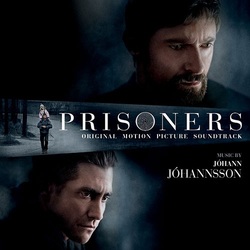
This year’s somber, critically-acclaimed thriller Prisoners marked Jóhannsson’s jump to the mainstream, though this is not, in fact, the first film he has scored. Directed by Denis Villeneuve and starring an impressive ensemble cast of Hugh Jackman, Jake Gyllenhaal, Viola Davis, Maria Bello, Terrence Howard, Melissa Leo, and Paul Dano, the slow-burn thriller tells the story of two girls’ abduction in a suburban Pennsylvanian town and the ensuing search to find them. Exploring with an unflinching lens the bleak reality of this premise, Prisoners is not for the faint of heart nor the easily bored. It unfurls its twists and turns in a precise but plodding manner, leading to a relentlessly moody, downbeat experience.
Jóhannsson’s score is very much what I expected him to bring to the table for such a concept. It intentionally counters much of the suspense in the film, though low string grumblings and deep, electronic droning still give the score some understated moments of tension. "Surveillance Video","The Intruder" and "The Snakes" explore this territory, with brief, glassy shimmers from the christal baschet peppered throughout. The droning, accomplished by combining a cello, double bass, organ, guitar, and piano and then heavily manipulating and processing them, serves to create palpable but indistinct layers of tension. Appropriately, it is a dark, grumbling blanket that gives preferential treatment to no one character, perhaps suggesting that any one of the film's characters could be a source of darkness, that each one of us has inside ourselves an unbridled potential for reactive violence.
Other sources of dark tension in the score draw their origin from a previously-recorded piece by Jóhannsson, heard in the track "Escape". Featuring a somewhat funereal solo cello over sustained strings and ambient droning, "Escape" can originally be found on And in the Endless Pause Came the Sound of Bees, a 2010 album from the composer. While it fits very well into the soundscape of the film, the primacy of the track's cello and choral work distinguish it a little from the score's other pieces. "The Intruder", "The Priest's Basement", and the tense "The Trans Am" all feature elements of "Escape", from its combination of low droning and chilling, high-octave strings to its distinctive cello idea. Though not directly quoting "Escape", "Following Kellar" also relies heavily on static droning and features a cello idea similar to that found in "Escape". This piece, like much of the film's drone music, is meant to follow Detective Loki (Jake Gyllenhaal) on his hunt for Keller's two missing girls.
Of all of the score's darker pieces, it is quite possibly "The Keeper" that is the most affecting. Featuring a chillingly executed glissando theme on string basses, the piece builds to great proportions with the addition of horns toward its conclusion, a rarity in Prisoners. "The Keeper" is a darkly beautiful, devastatingly threatening idea for the kind of inner ugliness the film explores.
The remainder of Jóhannsson's score for Prisoners dwells in more lyrical and beautiful territory than the ambient droning of its tension-based pieces. Announced by commanding percussion (actually four double basses being struck by hand) and deep pipe organ at the beginning of "The Lord's Prayer", the main theme for Keller (Hugh Jackman) is a slow, melancholic string progression that recurs a few times in the score. Given the prevalence of the film's spiritual elements, it is no surprise that this main theme has a vaguely spiritual quality about it, though it thankfully avoids becoming two church-like by featuring the pipe organ less prominently in the mix. It appears again in "Everyday Bible" to represent Keller and the film's spiritual elements. A related idea in "I Can't Find Them" incorporates more heavily the distinctive combination of the ondes martinet, similar to a theremin, and the christal baschet, similar to a glass harmonica, to accomplish a moody, glassy feeling. This very pure idea represents the two abducted girls in "I Can't Find Them" and seeks to underscore the tragic innocence of the girls over the horror of their abduction, another example of Jóhannsson's preference for avoiding typical thriller music. While still expectedly moody, it is less melancholic than Keller's string-based theme.
The final and by far most dramatic idea in the score is meant to represent the grief of the parents and is heard prominently in "Through Falling Snow". This theme provides the score with its greatest sense of movement and appears in a harrowing scene of climactic importance (which will not be related here as not to spoil anything). Blending a string ensemble with hints of the ondes martenot and christal baschet combination over propelling woodwinds, "Through Falling Snow" features a simple but beautiful dramatic build. The parents' grief theme recurs in "The Candlelight Vigil" in a more reserved, fragile rendition and is tied together with Keller's theme and the girls' abduction theme in "Prisoners", the film's end credits suite. Featuring a summary of the score's main ideas, the end credits suite is a good starting place if one is unsure of whether the minimal, moody soundscape of Prisoners will be to one's liking. Relying heavily on modal progressions, melancholic string work, and the ever beautiful and ethereal christal baschet and ondes martenot work of the renowned Thomas Bloch, Prisoners is an outstanding, subdued match for the film's dark brutality. No doubt it will not be everyone's cup of tea and may indeed prove too sparse for many film music enthusiasts, but Prisoners is still quintessential Jóhannsson, undeniably against the musical grain and understatedly beautiful.
| A Few Recommended Tracks: "The Lord's Prayer", "I Can't Find Them", "Through Falling Snow", "The Keeper", "Prisoners" Label: WaterTower Music Availability: 16 track edition (Note: Tracks are not in order of their appearance in the film and some feature altered or elongated performances of certain ideas) | |

 RSS Feed
RSS Feed
